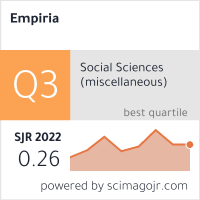Ten thousand journal articles later: ethnography of "The literature" in science
DOI:
https://doi.org/10.5944/empiria.18.2009.2004Keywords:
historia, ciencia del siglo XX, metodología, análisis de citación, retórica científica, interpretaciónAbstract
El artículo explora las dificultades que, para la historia de la ciencia y la tecnología del siglo XX, supone la lectura de un gran número de artículos científicos. Se argumenta que hay tensión entre dos estrategias distintas: la lectura en detalle de los artículos clave y el análisis de citaciones y otros métodos automáticos de rastrear la literatura. El desafío que supone alternar estos dos métodos y la necesidad de mantener una aproximación interpretativa cuando nos enfrentamos a una extensa literatura (miles o decenas de miles de artículos) pueden ser abordados aproximándonos a la literatura científica como si de un informante se tratara, en el sentido antropológico. Caracterizamos a la literatura científica como capaz de describir el cambio en los conceptos y en las prácticas científicas y técnicas. El artículo explora esta estrategia y propone centrarse en asuntos tales como los materiales y métodos (y las prácticas que conllevan), así como en los problemas a los que éstos contribuyen o intentan solucionar.
The article explores the difficulties, for the history of science and technology of the twentieth century, is reading a large number of scientific articles. It is argued that there is tension between two different strategies: detailed reading of key articles and citation analysis and other automated methods to track the literature. The challenge of alternate these two methods and the need to maintain an interpretive approach when faced with an extensive literature (thousands or tens of thousands of items) can be addressed approaching the scientific literature as if it were an informant in the anthropological sense. We characterize the literature as able to describe the change in the concepts and practices in science and technology. The article explores the strategy and intends to focus on issues such as materials and methods (and practices involved), as well as the problems they help or try to solve.











